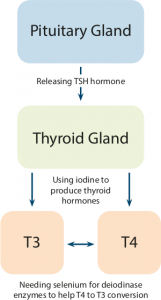Good thyroid health depends, in part, upon the bio-synthesis of selenium-dependent seleno-enzymes called deiodinases. These seleno-enzymes are key factors in thyroid hormone metabolism and regulation. Thyroid hormones regulate the body’s metabolism (think: energy expenditure, body weight, body temperature, digestion, heart rate, etc.).

There are three types of deiodinase enzymes. In normal thyroid function, these deiodinases regulate the activation and inactivation of the T4 and T3 thyroid hormones, as needed. Abnormal thyroid hormone function is closely associated with diminished health-related quality of life and with increased risk of cardiovascular morbidity and mortality.
In many selenium-poor regions of the world, including much of Europe and the Middle East, low selenium intake and status may cause sub-optimal synthesis of deiodinase enzymes and, consequently, sub-optimal thyroid gland function. Selenium is an essential trace element found in soil, and humans must get it from their food.
Consequently, selenium supplementation may have a beneficial effect on thyroid hormone production and activity in general and a beneficial effect with respect to mood, well-being, quality of life, and cardiovascular health in particular. These are the take-home messages from a 2024 sub-study of blood samples from the KiSel-10 clinical trial [Alehagen 2024].
Methodology of the Thyroid Hormones Sub-Study
In samples taken at the start of the KiSel-10 study and stored in mechanical freezers, Prof. Urban Alehagen and the research team determined the concentrations of thyroid stimulating hormone (TSH) and free T3, free T4, and reverse T3 hormones in the blood from 414 elderly Swedish citizens [Alehagen 2024].
Note that the baseline plasma selenium concentrations were quite low,
67 mcg/L on average in the entire sample. This selenium status is estimated to correspond to a daily selenium intake in food of 35 micrograms [Alehagen 2024]. For purposes of comparison, in a scoping review for the Nordic Nutrition Recommendations 2023, Alexander & Olsen have suggested a serum/plasma selenium status of 110 mcg/L as a level of saturation [Alexander & Olsen 2023].

To start the KiSel-10 study, the researchers had randomly assigned the study participants to an active treatment group receiving selenium (200 mcg/day) from selenium-enriched yeast and Coenzyme Q10 (200 mg/day) in the ubiquinone form or to a control group receiving matching placebos [Alehagen 2013]. Note: from a clinician’s point of view, there should be a theoretical advantage in using the two supplements together if there are deficiencies in the study participant sample [Alehagen & Aaseth 2015].
Using blood samples taken after 48 months of intervention, the researchers used t-tests and analysis of variance tests to evaluate the effect of the supplementation on changes in the concentrations of the TSH, T3, and T4 and thyroid hormones. They then compared the thyroid hormone outcomes with corresponding data on cardiovascular mortality and health-related quality of life scores in the KiSel-10 study sample [Alehagen 2024].
Study Outcomes of the KiSel-10 Thyroid Hormones Sub-Study
Prof. Alehagen and the research team made several interesting discoveries [Alehagen 2024]:
- At baseline, the study participants with the lowest plasma selenium concentrations had significantly higher levels of TSH hormone and significantly lower levels of free T3 hormone, compared to study participants with the highest plasma selenium concentrations. Note that TSH is the hormone that stimulates the thyroid gland to produce the T4 and T3 thyroid hormones. Higher TSH levels indicate reduced metabolism rates. T3 is the active thyroid hormone that regulates metabolism, heart rate, and other biological functions.
- Compared to the placebo treatment, 48 months of combined supplementation with selenium and Coenzyme Q10 significantly increased free T3 and reverse T3 levels, decreased free T4 levels, and lessened the increase in TSH levels. These are all desirable outcomes.
- In the active treatment group, differences in high and low TSH and free T4 levels did not lead to increases in 10-year cardiovascular mortality rates. In the placebo group, however, individuals with TSH and fT4 values above the median did have a significant increase in the 10-year cardiovascular mortality rate.
- In the same way, in the active treatment group, differences in high and low TSH and free T3 levels did not contribute to a decline in mental health-related quality of life scores. In the placebo group, by contrast, individuals with TSH levels greater than the median and free T3 less than the median had lower mental health-related quality of life measures versus individuals with TSH less than the median and free T3 greater than the median.
Explanations of the Effect of Selenium and CoQ10 Supplementation
Prof. Alehagen and the KiSel-10 research team concluded that considerable numbers of the elderly study participants may have been suffering from sub-optimal thyroid function because of their persistent selenium deficiency [Alehagen 2024].
Two explanations come to mind for the beneficial effect of the selenium supplementation of elderly Swedish citizens with low selenium status: 1) increasing the supply of selenium for the synthesis of the deiodinase enzymes and 2) drawing on the anti-inflammatory effects of the combined selenium and CoQ10 supplementation.
Deiodinase enzymes
In their report, the researchers explained the beneficial changes in thyroid hormone levels by reference to increased activity of the deiodinase enzymes [Alehagen 2024]. In the thyroid gland cells and in the liver and peripheral tissues, these deiodinase enzymes work to activate or inactivate the T3 and T4 thyroid hormones. They are needed to control the concentration of the thyroid hormones in the blood and in the cells and tissue.
Inflammation
A second explanatory mechanism may be the significant effect of the combined supplementation on inflammation [Alehagen 2024]. Both selenium and CoQ10 supplementation may have had an anti-inflammatory effect with respect to chronic systemic inflammation. In addition, selenium supplementation appears to reduce the level of inflammation caused by autoimmune thyroiditis [Wichman 2016].
Prof. Lutz Schomburg, Charité – Universitätsmedizin Berlin, has noted that persistent low dietary intake of selenium increases the risk of thyroid disease, hypothyroidism in particular. He suspects that, in cases of low selenium status, the immune system is not able to respond properly and gradually to challenges. The result is a disturbed and sub-optimal interaction between thyroid cells and lymphocytes, characterized by poorly controlled inflammation. The increased inflammatory state is associated with diminished thyroid function and with increased risk of cardiovascular disease [Schomburg 2020].
Conclusion: Selenium Intake linked to Thyroid Health
Relatively large numbers of otherwise healthy elderly individuals may be suffering from sub-optimal thyroid function because of insufficient selenium intake.
The sub-optimal thyroid function is associated with increased risk of cardiovascular disease and with reduced quality of life.
Selenium supplementation may lead to an increase in the synthesis of selenium-dependent deiodinase enzymes. This, in turn, may result in the beneficial changes in thyroid hormones observed in the KiSel-10 sub-study.
Selenium supplementation is also associated with reduced levels of chronic systemic inflammation and with reduced levels of pro-inflammatory autoimmune thyroiditis.
Sources
Alehagen U, Alexander J, Aaseth JO, Larsson A, Opstad TB. Supplementation with selenium and coenzyme Q10 in an elderly Swedish population low in selenium — positive effects on thyroid hormones, cardiovascular mortality, and quality of life. BMC Med. 2024;22:191.
Alehagen U, Johansson P, Svensson E, Aaseth J, Alexander J. Improved cardiovascular health by supplementation with selenium and coenzyme Q10: applying structural equation modelling (SEM) to clinical outcomes and biomarkers to explore underlying mechanisms in a prospective randomized double-blind placebo-controlled intervention project in Sweden. Eur J Nutr. 2022 Sep;61(6):3135-3148.
Alehagen U & Aaseth J. Selenium and coenzyme Q10 interrelationship in
cardiovascular diseases – A clinician’s point of view. Journal of Trace Elements in Medicine and Biology. 2015;31:157-162.
Alehagen U, Johansson P, Björnstedt M, Rosén A, Dahlström U. Cardiovascular mortality and N-terminal-proBNP reduced after combined selenium and coenzyme Q10 supplementation: a 5-year prospective randomized double-blind placebo-controlled trial among elderly Swedish citizens. Int J Cardiol. 2013 Sep 1;167(5):1860-6.
Alexander J, Olsen AK. Selenium – a scoping review for Nordic Nutrition Recommendations 2023. Food Nutr Res. 2023 Dec 28;67.
Schomburg L. The other view: the trace element selenium as a micronutrient in thyroid disease, diabetes, and beyond. Hormones (Athens). 2020 Mar;19(1):15-24.
Wichman J, Winther KH, Bonnema SJ, Hegedüs L. Selenium supplementation significantly reduces thyroid autoantibody levels in patients with chronic autoimmune thyroiditis: a systematic review and meta-analysis. Thyroid. 2016 Dec;26(12):1681-1692.
The information presented in this review article is not intended as medical advice. It should not be used as such.
